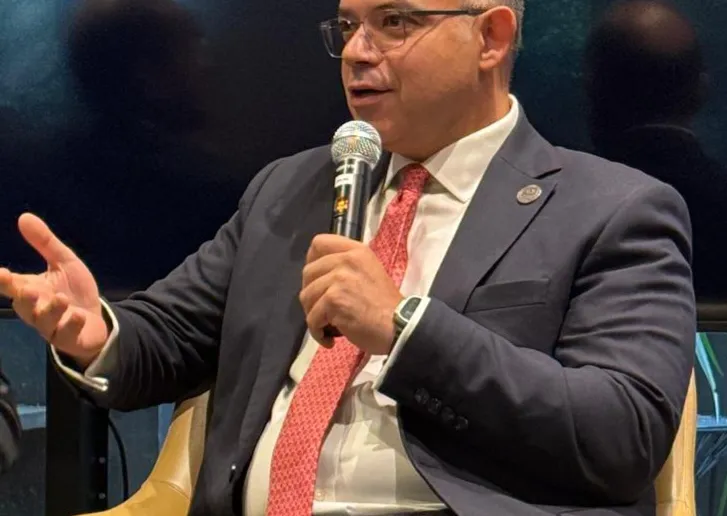We are constantly working to improve access to investment and financing products for individuals and companies.
Dr. Mohamed Farid, Chairman of the Egyptian Financial Regulatory Authority (FRA), stated that the story of reforming the non-banking financial sector presents numerous investment opportunities across various activities. He extended an invitation to explore the currently available opportunities.
This came during a discussion session organized by the British Egyptian Business Association (BEBA) in London, attended by representatives of British and international banks, the financial and business community, and international investors. As part of BEBA’s promotional business mission titled “Egypt’s New Era… Investment Opportunities,” Dr. Farid held a series of meetings with representatives of several banks and financial and investment institutions in London. These meetings aimed to present developments in the reform and development plan for the non-banking financial sector. Attendees included representatives from Citibank, Standard Chartered, and Bank of New York, alongside Dr. Mohamed Abdelaziz, FRA Deputy Chairman; Dr. Tarek Seif, Executive Director of the Financial Services Institute; Mohamed Eyad, FRA Media Advisor; and representatives of other government entities.
The FRA Chairman emphasized that improving the business environment and innovating non-banking financial mechanisms and products are top priorities for attracting more investments in the coming period. He affirmed the FRA’s commitment to enhancing the business climate in the non-banking financial sector to boost the confidence of both local and foreign investors. He noted that the credibility of the investment climate begins with the trust of domestic investors in policies and the business environment.
He added that the FRA is implementing Egypt’s national strategy, “Egypt Vision 2030,” by unleashing private sector growth through economic reform agendas. Additionally, the FRA is advancing digital transformation, a key driver in strengthening the role of the non-banking financial sector in the national economy by establishing fintech regulations.
Farid stated that financial technology (fintech) and digital transformation are fundamental to increasing savings rates, promoting financial, investment, and insurance inclusion, and boosting investments—enabling the economy to rely more on domestic financing rather than foreign funding. Thus, fintech is the pathway to building a resilient economy.
He explained that the FRA is working to improve access to investment and financing products for individuals and companies. To this end, it has already implemented an ambitious plan to digitize non-banking financial services, recognizing technology’s pivotal role in shaping the future.
He highlighted the FRA’s issuance of regulatory and executive frameworks for the listing and trading of Special Purpose Acquisition Companies (SPACs) as a step to support businesses in securing growth financing.
Additionally, Farid confirmed the FRA’s focus on implementing an integrated electronic system based on three components: digital identity verification, smart contracts, and linking identity data with mobile phone numbers. This step has paved the way for a significant leap, as recent FRA data shows over 200,000 new accounts in gold investment funds within one year, with investments exceeding EGP 2 billion—a previously unfamiliar product in the market.
He noted that Egypt is a pioneer in launching the first voluntary carbon market in Africa, regulated by Egyptian financial authorities. Launched in August 2024, this market is a key element in reducing carbon emissions and facilitates access to international climate financing for projects aiming to lower their carbon footprint. It also strengthens Egypt’s position in sustainable finance and climate-related investments.
Farid emphasized that diversifying financial and investment tools enables stakeholders and investors to meet their needs and achieve their goals. He reiterated the FRA’s ongoing objective: establishing stable, flexible, and transparent regulatory policies to enhance the competitiveness of non-banking financial markets.
Unified Insurance Law: A Qualitative Leap for the Sector
He added that the Unified Insurance Law, issued in July 2024, marks a qualitative shift for the insurance sector, enhancing its role in serving the national economy by improving national savings levels. Farid reviewed the FRA’s efforts to develop the insurance sector by introducing new insurance products and accelerating the use of technology in insurance services—boosting insurance inclusion and expanding coverage for more beneficiaries.
The implementation of the Unified Insurance Law supports sustainable growth, attracts more investments, and provides new insurance coverage for all segments of society. The FRA ensures its decisions add value to the sector, the Egyptian economy, and society, enabling individuals to benefit from non-banking financial services—whether through investing in stocks and bonds, purchasing insurance policies, or obtaining non-bank financing.
Farid concluded that the FRA continuously monitors markets wisely to ensure stability, protect stakeholders, and enhance risk management, governance, and digitization while simplifying procedures. Developing markets and introducing new products that provide investment opportunities in the non-banking financial sector remains a constant goal, alongside fostering a favorable environment for investment and growth.
For More Visit Our Website





Join The Discussion